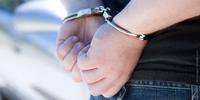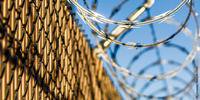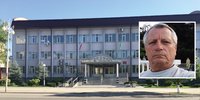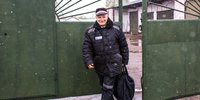The Case of Voishchev in Maykop
Filter
- #
Investigator of the Investigative Directorate of the Investigative Committee of the Russian Federation for the Republic of Adygea Zaurbiy Blyagoz initiates a criminal case against Nikolai Voishchev under Part 1 of Article 282.2 of the Criminal Code of the Russian Federation.
- #
- #
The Maykop City Court places Nikolay Voishchev in a pre-trial detention center.
- #
During a visit to the lawyer, it turns out that Nikolai is the fifth prisoner in a four-bed cell. One of the cellmates gave up his bed to the believer, while he sleeps on the floor. Nikolay says that the attitude on the part of the administration of the institution is normal, but it is cold in the pre-trial detention center, thin blankets.
In his youth, Nicholas suffered two serious head injuries, and against the background of what is happening, he often has headaches. In addition, the believer is struggling with the disease, but after being transferred from the temporary detention facility to the pre-trial detention center, he was left without the necessary medicines. In this regard, Voishchev appeals to the administration of the pre-trial detention center with an application for a medical examination.
Despite the difficulties, Nicholas tries not to lose his presence of mind: "In my life there were many trials, now also imprisonment. And I know it takes some time to get used to the new situation."
- #
The criminal case of Nikolay Voishchev is submitted to the Maykop City Court of the Republic of Adygea and appointed to Judge Zaurbiy Birzhev.
- #
The lawyer asks the court to transfer the accused to house arrest due to his deteriorating state of health. The defendant says that in the summer of last year he began to undergo examination in the oncology dispensary. "The doctor prescribed the treatment and prescribed an in-depth examination after another three months. But I never finished it because of my detention," Voishchev said. "While in jail, I applied to consult a doctor, but my request was not granted."
Nevertheless, the judge extends the period of detention in the pre-trial detention center for six months.
- #
The hearings in the case of Nikolai Voishchev begin. 42 people come to support the believer, waiting for news from the courtroom.
The prosecutor reads out the indictment. Voishchev disagrees with the charges against him: "I don't understand what criminal I have committed?" The case involves a secret witness "Dmitrienko", with whom, according to the prosecution, Voishchev talked about the Bible.
The court rejects the defense's request to return the case to the prosecutor in order to eliminate the violations committed in the preparation of the indictment.
- #
- #
The prosecutor reads out both volumes of the criminal case. Its materials contain video and audio recordings obtained during the surveillance of the believer, including a recording of the video conference from the screen of a mobile phone. The state prosecutor also mentions positive characteristics from the place of work, from the chairman of the territorial public self-government and others.
- #
It becomes known that in February, Nikolai Voishchev was examined in the regional hospital for a number of serious diseases, he was prescribed treatment. He must take some medications constantly, but he does not receive proper treatment in the pre-trial detention center.
The cell in which Voishchev is kept is overcrowded.
Nicholas has not been given letters since his imprisonment, but in March he received 250 pieces at once. In total, he has already received more than 400 letters and is grateful to friends and family for their support.
- #
A secret witness under the pseudonym Andrey Kozyrev is being interrogated. According to him, he has known Jehovah's Witnesses for a long time - in 2014 he became an adherent of this religion, and at the beginning of 2020 he stopped attending services.
The witness describes Voishchev as a calm and shy person. When asked whether there were cases when the defendant showed any aggression in words or behavior, threatened or coerced to commit certain actions, the witness replies that "this did not happen." Kozyrev also says that during the services he did not hear from Voishchev calls for violence, disrespect and oppression of people of other faiths, for the severance of family ties with persons who are not Jehovah's Witnesses and for non-recognition of decisions of state bodies and local self-government bodies.
- #
A secret witness under the pseudonym Dmitry Dmitrienko is being interrogated. His testimony contradicts what he gave at the investigation stage - for example, he says that he was interrogated once, and the case file mentions two meetings with the investigator on different dates.
"Dmitrienko" describes the defendant as a well-read and modest person who adheres to deep religious convictions. According to the witness, "there was nothing aggressive [on the part of Voishchev]," but the witness refuses to declassify himself, stating that "it threatens his life and health."
The witness finds it difficult to answer some of the questions of Nikolai Voishchev and his lawyer or complains about the poor quality of communication.
- #
The court proceeds to the examination of material evidence. The video recording of the service begins.
- #
The court continues to watch the video of the worship service, which talks about how to improve reading skills. On the recording, believers read passages from the Bible and discuss what they can learn from biblical characters.
- #
At the hearing, the protocols of the local religious organization, dated from 1998 to 2010, are examined. The investigation uses them as material evidence, although these documents do not relate to the period imputed to the guilt and are not presented in the case in full.
The defense emphasizes that the previously viewed part of the video presents a meeting of believers, which is of a purely religious nature, and it does not discuss any issues related to the activities of the liquidated legal entity. For example, the recording shows how believers watch the videos "Why don't ants stand in traffic jams?" and "Flight of the bumblebee" and discuss what can be learned from nature and its Creator.
- #
The defense submits a petition for the appointment of a forensic psycholinguistic examination and gives the following justification: "Linguistic and psychological analysis create an objective basis for the subsequent legal assessment of the material conducted by the court."
The state prosecutor considers the petition unfounded and not related to the subject of proof in this criminal case, since, in his opinion, the information materials used at the service, including "Holy Scripture - New World Translation", have already been included in the list of extremist materials. He also refers to the fact that Ruslan Levinsky's psycholinguistic expertise is already present in the case.
The court supports the position of the prosecutor.
- #
The defense presents the religious opinion of the specialist Ekaterina Elbakyan on the examination of Levinsky.
Analyzing the video, religious scholar Elbakyan pointed out that the purpose of the liturgical meetings of Jehovah's Witnesses is a collective confession of faith, and she found no reason to consider this service a meeting of a legal entity. The expert also found no signs of religious hatred, incitement to discrimination, hostility and violence, propaganda of exclusivity, superiority of a person on the basis of his religious affiliation in Voishchev's statements.
Elbakyan concluded: "This conclusion of the expert [Levinsky] is not based on the provisions of generally accepted scientific data in the field of religious studies, the conclusions of the expert's conclusion seem to be unfounded."
The prosecutor asks for time to familiarize himself with the conclusion of the religious scholar, so the judge postpones the issue of attaching the document to the case file to the next meeting.
The interrogation of the defendant Nikolai Voishchev begins. He says that the accusation is groundless and notes that there are no victims in the case and no evidence of the distribution of extremist materials by him.
- #
The court attaches to the case file the opinion of a specialist in religious studies Ekaterina Elbakyan.
The defense submits a motion to exclude from the list of evidence the forensic psycholinguistic examination performed by Ruslan Levinsky. According to the lawyer, "Levinsky went beyond his competence as an expert and answered purely legal questions, the resolution of which falls within the exclusive competence of the court." In addition, Levinsky does not have a higher professional education in the field of linguistics, which does not give him the right to perform this examination in the linguistic part. The court refuses the petition, as well as the summoning and questioning of this expert.
- #
To be published later.
Nikolay Voishchev's last word in Maykop - #
Nikolay Voishchev is in the process of being moved to a place where he will serve his sentence for his faith.
- #
It becomes known that Nikolai Voishchev was transferred to correctional colony No. 8 in the city of Almetyevsk. He is now in quarantine.
- #
Nikolay Voishchev receives the necessary medicines for his illness. He is retired and may not work.
Nikolay has good relations with other prisoners, he is treated with respect, including because of his venerable age. The barracks where he lives is designed for 20 people. It has freedom of movement compared to a pre-trial detention center.
The believer has a Bible. When he was in the pre-trial detention center, he received about 800 letters, but upon arrival at the colony, the letters have not yet arrived.
- #
- #
In the morning, 70-year-old Nikolai Voishchev died of a serious illness. In November last year, doctors confirmed that he had progressive oncology. All this time, Irina, whom he married in the summer of 2025, was next to him.



